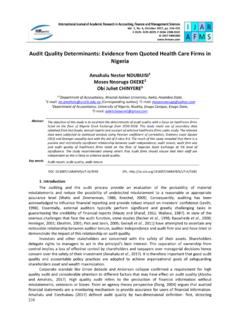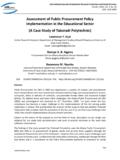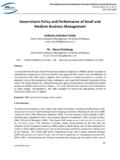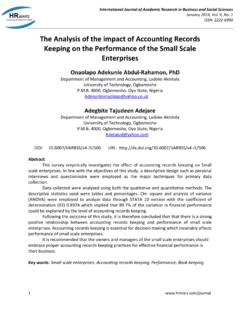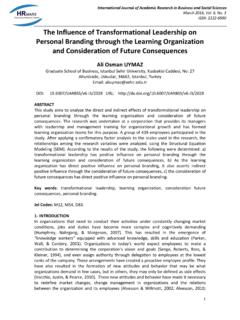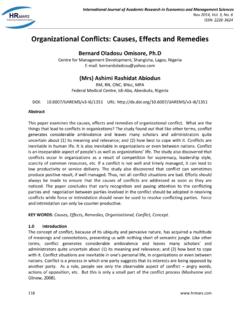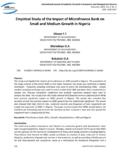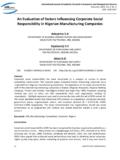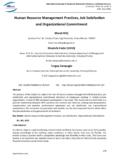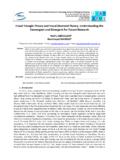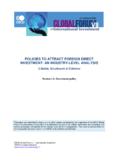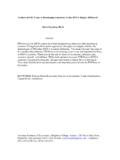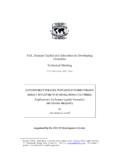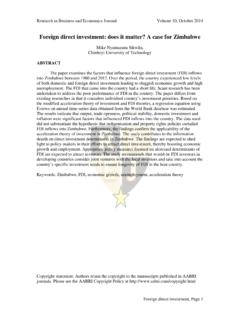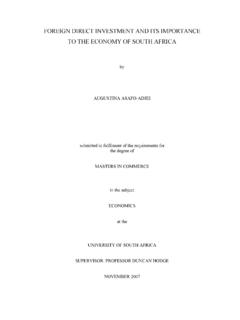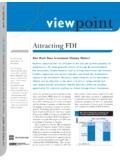Transcription of Impact of Foreign Direct Investment on Nigeria …
1 International Journal of Academic Research in Business and Social Sciences August 2014, Vol. 4, No. 8 ISSN: 2222-6990 234 Impact of Foreign Direct Investment on Nigeria Economic Growth Adeleke Kunle M. Department of accountancy Federal Polytechnic, Offa, Kwara State, Nigeria Olowe Department of accountancy Osun State College of Technology, Esa-Oke, Nigeria Fasesin Oladipo Oluwafolakemi Department of Accountancy Osun State Polytechnic, Iree, Nigeria DOI: URL: Abstract The study analyzed the Impact of Foreign Direct Investment on Nigeria economic growth over the period of 1999- 2013. The main type of data used in this study is secondary; sourced from various publications of Central Bank of Nigeria , such as; Statistical Bulletin, Annual Reports and Statement of Accounts.
2 The regression analysis of the ordinary least square (OLS) is the estimation technique that is being employed in this study to determine the relationship between and Impact of the Direct Foreign Investment on economic growth. The findings revealed that economic growth is directly related to inflow of Foreign Direct Investment and it is also statistical significant at 5% level which implies that a good performance of the economy is a positive signal for inflow of Foreign Direct Investment . This implies that Foreign Direct Investment is an engine of economic growth. The paper recommended that government should liberalize the Foreign sector in Nigeria so that all barriers to trade such as arbitrary tariffs; import and export duties and other levies should be reduced so as to encourage investors.
3 Key words: Foreign Direct Investment , Economic Growth, OLS, CBN, Nigeria Introduction Foreign Direct Investment (FDI) is a Direct Investment into production or business in a country by an individual or company of another country, either by buying a company in the target country or by expanding operations of an existing business in that country. Foreign Direct Investment is in contrast to portfolio Investment which is a passive Investment in the securities of another country such as stocks and bonds. World Bank (1996) conceptualized Foreign Direct Investment (FDI) as Investment that is made to acquire a lasting management interest (usually 10% of voting stock) in an enterprise and operating in a country other than that of the investors International Journal of Academic Research in Business and Social Sciences August 2014, Vol.
4 4, No. 8 ISSN: 2222-6990 235 (define according to residency)the investors purpose being an effective voice in the management of earning either long term capitalor short term capital as shown in the nations balance of payments account statement (Macaulay, 2012). Broadly, Foreign Direct Investment includes mergers and acquisitions, building new facilities, reinvesting profits earned from overseas operations and intra company loans. In a narrow sense, Foreign Direct Investment refers just to building new facilities. Todaro, (1977) believed that FDI encourages the inflow of technology and skills and fills the gap between domestically available supplies of savings, Foreign exchange and government revenue.
5 It also encourages the inflow of technology and skills. Onu, (2012) asserted that the contributions of Foreign Investment to Japan after the World War II and in South Korea after the Korean War has tremendously assisted the economic growth of these countries by providing the local economy with a source of Foreign skill, technology, management expertise and human resource development through international training and collaboration. Macaulay, (2012) asserted that Nigeria s Foreign Investment can be traced back to the colonial era, when the colonial masters had the intention of exploiting our resources for the development of their economy.
6 There was little Investment by these colonial masters. With the research and discovery of oil Foreign Investment in Nigeria , but since then, Nigeria s Foreign Investment has not been stable. The Nigerian governments have recognized the importance of FDI in enhancing economic growth and development and various strategies involving incentive policies and regulatory measure have been put in place to promote the inflow of FDI to the country. According to Lall, (2002), privatization was also adopted, among other measures, to encourage Foreign investments in Nigeria . This involved transfer of state-owned enterprises (manufacturing, agricultural production, public utility services such as telecommunication, transportation, electricity and water supply), companies that are completely or partly owned by or managed by private individuals or companies.
7 Shiro (2009) noted that since the enthronement of democracy in 1999, the government of Nigeria has taken a number of measures necessary to woo Foreign investors into Nigeria . These measures, he noted, include the repeal of laws that are inimical to Foreign Investment growth, promulgation of Investment laws, various oversea trips for image laundry by the President among others. Thus, this study assesses the Impact of FDI on economic growth in Nigeria within the period 1999-2013. Literature Review Foreign Direct Investment represents a veritable source of Foreign exchange and technological transfer, especially to a developing economy like Nigeria .
8 It can be analyzed in terms of inflow of new equity capital (change in Foreign share capital), re- invested earning (unremitted profit), trade and supplier s credit, net inflow of borrowing and other obligations from the parent company or its affiliates (Nwankwo et al, 2013). Olopoenia (1985) observed that Foreign Investment could be seen as an additional factor of production and as a supplement to the national savings effort of the capital importing country. This is meant to relax both the Foreign exchange and savings constraint on the rate of growth of output in the recipient country. Agada and Okpe (2012) saw FDI as an attempt by individuals, groups, companies and government of a nation to move resources of productive purpose across its country to another country with the anticipation of earning some surplus.
9 Otepola (20012), asserted that FDI has emerged as the most important source of external resource flows to developing countries over International Journal of Academic Research in Business and Social Sciences August 2014, Vol. 4, No. 8 ISSN: 2222-6990 236 the years and has become a significant part of capital formation in these countries, though their share in the global distribution of FDI continue to remain small or even declining. Caves (1996) also observed that the rationale for increased efforts to attract more FDI stems from the belief that FDI has several positive effects. Among these are productivity gains, technology transfers, and the introduction of new processes, managerial skills and know-how in the domestic market, employee training, international production networks, and access to markets.
10 Empirical Review on the Relationship between FDI and Economic Growth Previous studies on the Foreign Direct Investment (FDI) and economic growth in Nigeria and other countries provided inconclusive evidence. Lall (2002) opined that FDI inflow affects many factors in the economy and these factors in turn affect economic growth. This review shows that the debate on the Impact of FDI on economic growth is far from being conclusive. The role of FDI seems to be country specific and can be positive, negative or insignificant, depending on the economic, institutional and technological conditions in the recipient countries. For instance, Solomon and Eka (2013) investigated the empirical relationship between Foreign Direct Investment and economic growth in Nigeria .
